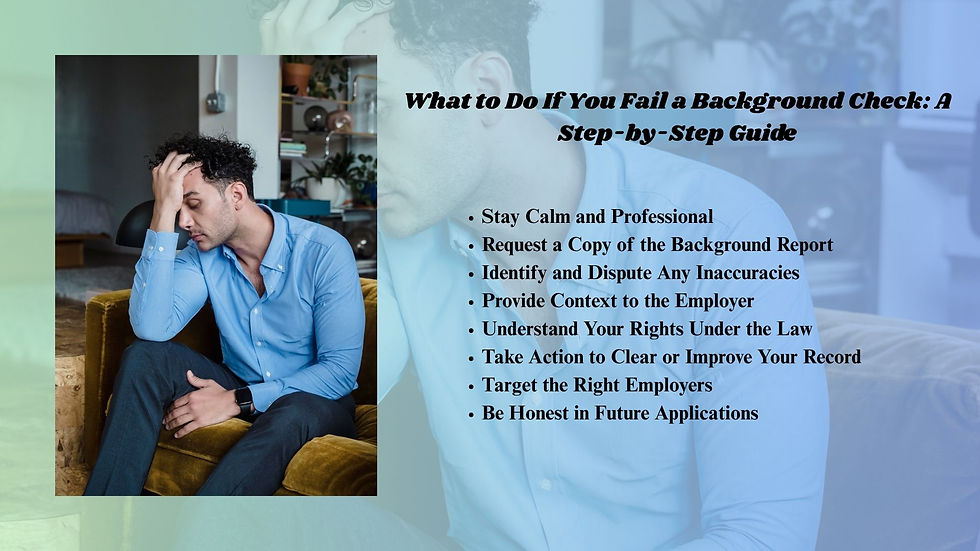What to Do If You Fail a Background Check: A Step-by-Step Guide
- Uri Burger
- Aug 1, 2025
- 4 min read

Failing a background check can feel like hitting a dead end—especially if you were this close to landing a job. But before you panic or assume the worst, it’s important to know that a failed background check doesn’t always mean the end of the road. There are various reasons a background check can fail for. Moreover, there are certain candidate rights that are also crucial to be considered in case a background check fails.
In this comprehensive guide, we’ll walk you through why background checks fail, what your rights as a candidate are, and the steps you can take to correct mistakes or move forward—confidently and legally.
Why Do Background Checks Fail?
Background checks are used by employers to verify your identity, qualifications, and potential risks. Here are some of the most common reasons a background check could raise red flags:
1. Criminal History
Convictions for theft, assault, or fraud may concern employers—especially in roles involving sensitive data, money, or vulnerable people.
Even arrests that didn’t lead to convictions may show up in certain states unless expunged.
2. Inaccurate or Incomplete Information
Typos, outdated addresses, or mistaken identities can trigger a false failure.
Common with candidates who have common names or changes due to marriage/divorce.
3. Employment Discrepancies
Gaps, falsified titles, or fabricated experience will often be flagged during employment verification.
4. Poor Credit History
Especially relevant for jobs involving financial responsibility or access to client funds.
High debt, defaults, or bankruptcies may raise concerns.
5. Driving Record Issues
DUI/DWI charges, excessive violations, or suspended licenses matter for roles requiring driving.
6. Professional License Issues
Expired, suspended, or unverified licenses (e.g., nurses, teachers, real estate agents) can derail an offer.
Step-by-Step Guide: What to Do If You Fail a Background Check
Here’s a clear process you can follow if you’ve been told your background check raised concerns or disqualified you.
Step 1: Stay Calm and Professional
Your first instinct might be to react emotionally—but it’s essential to remain calm. Many background check failures are due to errors or miscommunication. You may be able to resolve the issue quickly without jeopardizing your candidacy.
Tip: Don't assume the employer made their final decision unless you’ve received a formal written notice.
Step 2: Request a Copy of the Background Report
Under the Fair Credit Reporting Act (FCRA), you have the legal right to receive:
A copy of your background check report, and
A "pre-adverse action" notice from the employer if the report influenced a negative decision.
This gives you a chance to review the report and dispute any errors before the employer finalizes their decision.
Step 3: Identify and Dispute Any Inaccuracies
Once you receive the report, go through it line by line to look for:
Mismatched names or addresses
Charges that were dropped or expunged
Employment or education inaccuracies
Mistaken criminal records (especially if someone has a similar name)
If something’s wrong, you can file a dispute with the screening company. They have 30 days to investigate and correct any confirmed errors.
Pro Tip: Keep written records of your communication with both the employer and the background check agency.
Step 4: Provide Context to the Employer
Even if the information is accurate, you still have a chance to explain your side.
For example:
A 7-year-old misdemeanor may no longer be relevant to your current character.
A bad credit score might have resulted from a medical emergency or job loss.
A license suspension may have been resolved months ago.
Many employers appreciate transparency. Providing written context or supporting documentation may sway the final decision in your favor.
Step 5: Understand Your Rights Under the Law
You have several protections under federal and state law:
Right to Notice – Employers must notify you before taking adverse action due to a background check.
Right to Dispute – You can challenge incorrect or outdated information.
Right to Consent – Employers must get your written permission before conducting a background check.
Ban-the-Box Laws – In many states and cities, employers can't ask about criminal history until later in the hiring process.
State laws vary significantly, so check your local regulations or consult an employment attorney if needed.
Step 6: Take Action to Clear or Improve Your Record
If your failed check is legitimate but still costing you opportunities, take proactive steps to improve your background:
Criminal Records:
Explore expungement or sealing options available in your state.
Consider completing a rehabilitation or reentry program if applicable.
Credit Issues:
Begin a credit repair strategy: paying off debts, disputing errors, or working with a financial counselor.
License or Driving Issues:
Get your license reinstated, clear points off your record, or complete required certifications.
Each step shows future employers that you’re responsible, proactive, and improving—which can boost your appeal.
Step 7: Target the Right Employers
Not all employers weigh background checks the same way. Some are more open to hiring candidates with:
Past convictions but a clean recent record
Rehabilitative experiences or training
Clear explanations and transparency
Look for companies that are Fair Chance Employers, participate in second-chance hiring programs, or are open to applicants with non-traditional backgrounds.
Step 8: Be Honest in Future Applications
It’s tempting to omit a past conviction or credit issue—but honesty is essential.
Instead, consider how to own your story:
“I had a setback in 2017, but since then I’ve completed two certifications, kept a steady work record, and focused on growth.”
Being upfront allows employers to trust your integrity—and gives you more control over the narrative.
Final Thoughts: A Failed Background Check Isn't the End
Failing a background check can feel discouraging, but it’s not a career death sentence. Whether it's a minor error, a misunderstanding, or something more serious, you have options—and rights.
The key is to:
Stay calm,
Get the facts,
Dispute inaccuracies,
Provide context,
Take corrective action, and
Apply where your growth will be valued.
In today’s competitive market, many employers are shifting toward skills- and potential-based hiring. With the right strategy, even a failed background check can become a stepping stone to future success.
FAQs
Q: How will I know if I failed a background check?
You’ll typically receive a pre-adverse action notice, followed by a copy of the report and a chance to dispute.
Q: How long do background checks stay on file?
Depends on the record—criminal charges may stay permanently unless expunged. Credit issues may last 7–10 years.
Q: Can I sue if a background check report is wrong?
Yes. Under the FCRA, you can file a claim for damages if a background check company provides inaccurate or outdated info that causes job loss.




Comments